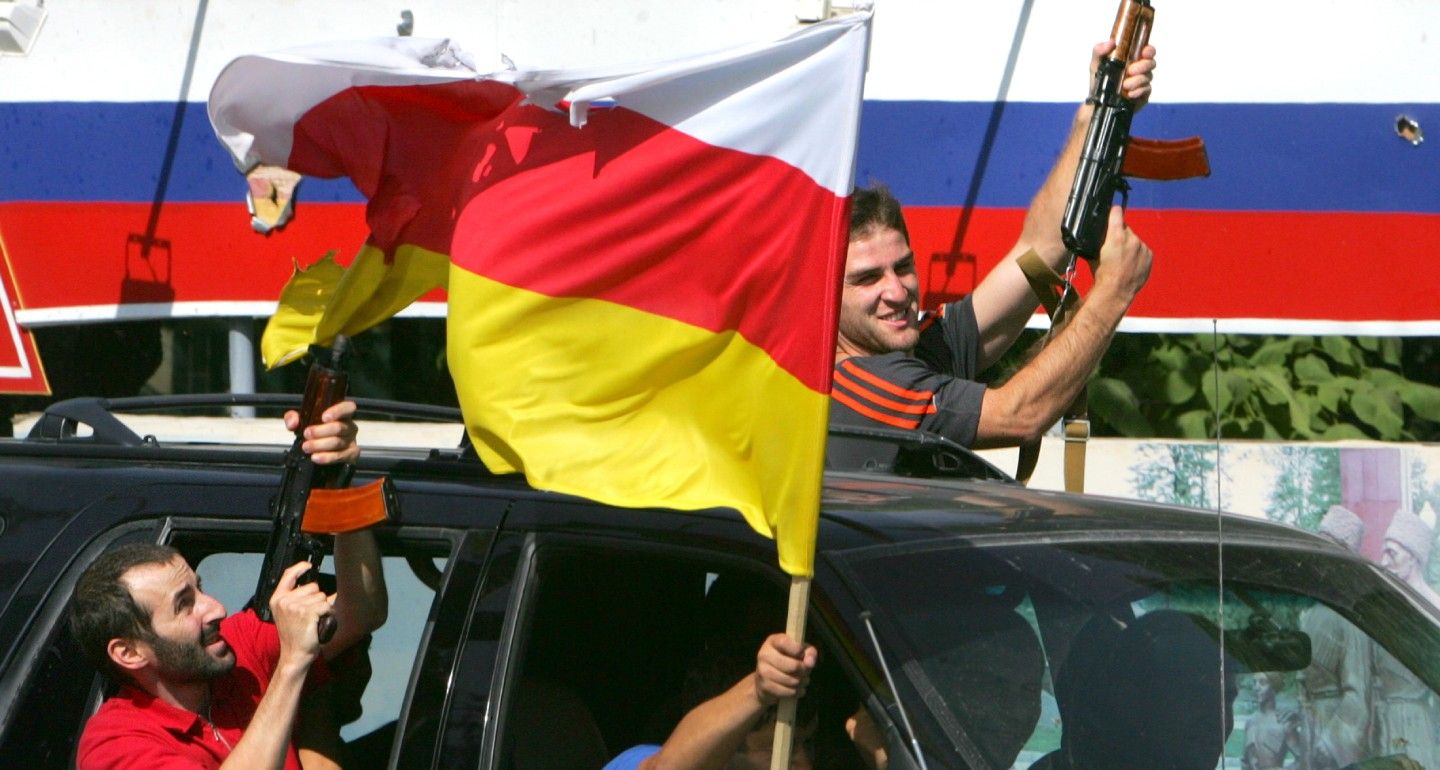The possibility of Georgia regaining control over its breakaway regions of Abkhazia and South Ossetia has become one of the main issues in upcoming parliamentary elections in the South Caucasus nation. However, even though the Georgian government has taken an increasingly pro-Russian stance in recent years, and is obviously willing to take its larger neighbor’s interests into account, Moscow—which has long propped up the two self-proclaimed republics—has not yet formulated a proper response.
There was never any doubt that Russia’s decision to recognize Abkhazia and South Ossetia as sovereign states after Georgia’s defeat in a short war with Russia in 2008 would store up problems for the future. Around that time, I was able to ask Russian presidential aide Sergei Prikhodko about the issue. He replied: “Let’s imagine that the Georgian government changes. That the new leadership designates [then Georgian president Mikheil] Saakashvili a war criminal, jails him, and admits that Tbilisi’s actions in August 2008 were a mistake, perhaps even criminal. Then this new government shows it’s ready to turn away from the West toward Russia, return to the Commonwealth of Independent States, reject accession to NATO and even the European Union, instead joining the [Moscow-led] Collective Security Treaty Organization. And in return, they only ask one thing: to return Abkhazia and South Ossetia. What would be our answer?”
Prikhodko died in 2021, but in the sixteen years since he uttered those words, they have become reality. Georgia’s new government has now been in power for more than a decade; Saakashvili has been behind bars for three years; and Georgian officials have increasingly hostile relations with the EU and the United States. Admittedly, there are still no diplomatic relations between Moscow and Tbilisi, but economic and humanitarian ties are strong.
Russian emigres and tourists have flocked to Georgia since the full-scale invasion of Ukraine; direct flights between the two countries were restored in 2023; and Russia dropped its visa requirements for Georgians in October. Meanwhile, Tbilisi has refused to join Western countries in imposing sanctions on Russia, and has strained relations with Kyiv as a result.
Georgia’s shadow ruler Bidzina Ivanishvili has even pledged that after parliamentary elections on October 26 he will punish the “instigators” of the 2008 war and apologize to South Ossetians. Georgian Prime Minister Irakli Kobakhidze has used similar rhetoric, even specifying 2030 as the deadline for reabsorbing Abkhazia and South Ossetia.
Ultimately, although it is the Kremlin that calls the shots when it comes to Abkhazia and South Ossetia, Russia has been slow to respond to the signals from the Georgian leadership on this issue. The default official Russian position remains that laid out by President Vladimir Putin in 2015 when he said that Georgia’s territorial integrity was a decision for the Georgian, Abkhaz, and South Ossetian people, and that Russia would accept “any decision” they came to.
Putin’s words were intentionally vague, and he has ignored the question of how exactly the Kremlin would respond. That is no idle question: if there were some sort of agreement, Russia would be obliged to revoke its formal recognition of Abkhazia and South Ossetia, and also do something about the other countries it persuaded to do the same (Nicaragua, Venezuela, Syria, and Nauru also recognize Abkhazia and South Ossetia).
The first serious response to Georgia’s recent overtures was a statement by Russian Foreign Minister Sergey Lavrov in New York on September 28. While Lavrov was generally positive, he more or less repeated Putin’s 2015 position.
However, the Georgian government’s rhetoric about reestablishing territorial integrity is not only aimed at a foreign audience. It’s also for Georgian voters ahead of the upcoming parliamentary elections. The ruling party, Georgian Dream, is stoking hopes among ordinary Georgians about the return of Abkhazia and South Ossetia.
Yet without Moscow’s approval, it’s impossible to imagine substantive negotiations taking place, and there are plenty of complications. Abkhazia and South Ossetia are not only formally recognized by Russia, they are also heavily used by the Russian military. There are military bases and Federal Security Service (FSB) units deployed in both territories. It’s also unclear whether elites in Abkhazia and South Ossetia would be willing to countenance unification.
For now, Russia perhaps sees no reason to devote serious attention to such a complex issue: after all, it’s not yet clear who it will be dealing with in Tbilisi after the election. Polling suggests that it could go either way.
There is certainly a lot hanging on the election. Georgian Dream has turned the vote into a matter of life and death. Its threats to ban opposition parties if it wins the election have only made the opposition more angry and more determined.
Meanwhile, the ruling party and its founder Ivanishvili are scarcely less motivated themselves: they have made too many enemies both at home and in the West. A loss of power could see Saakashvili released from prison and Ivanishvili taking his place behind bars.
If Georgian Dream does win, then it will be in its interests—as well as in Moscow’s—to keep talking about reintegrating Abkhazia and South Ossetia. Getting such a process under way would allow the Kremlin to look as if it’s helping a neighbor to restore its territorial integrity (in direct contrast to what Russia is doing in Ukraine). And even if it all comes to nothing, or almost nothing, it will involve high-level contacts between the two states. The topic of the breakaway regions can only be seriously discussed between political leaders, not ambassadors, and that means Russia-Georgia ties will continue to grow stronger.




